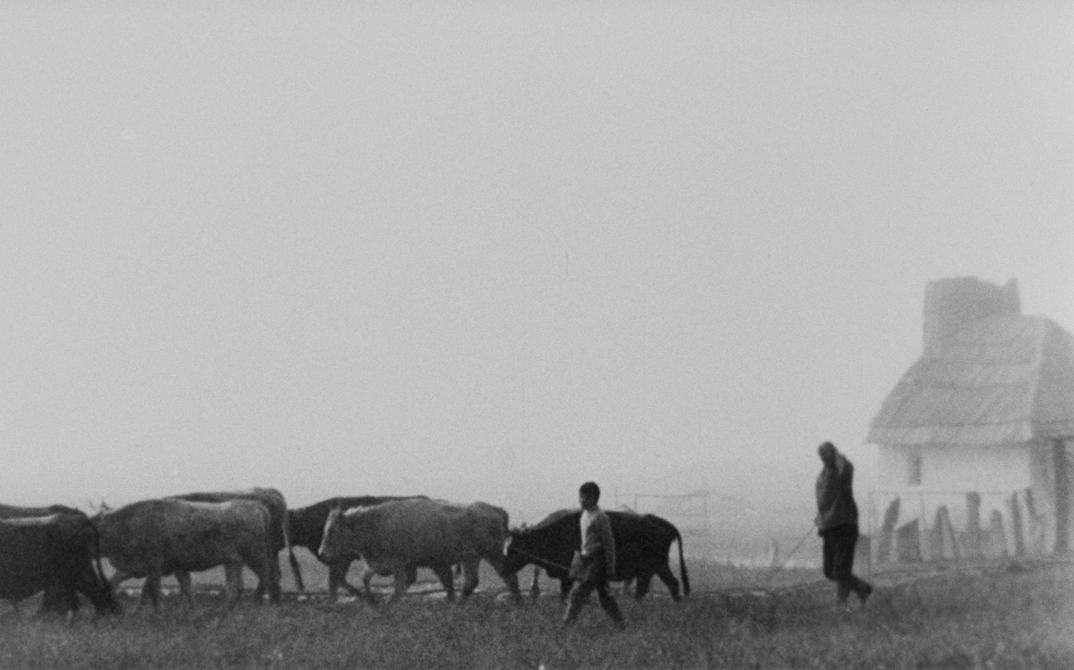
Since the beginning of the 20th century, Georgia has had a very active film scene, which has brought forth its own unique cinematic languages and styles. Thanks to the work of Erika and Ulrich Gregor, the founders of Arsenal who had a very specific interest in Georgian cinema, a corresponding emphasis has been placed on this particular cinema culture at both Arsenal and the Berlinale Forum since the 1960s. This has meant that, alongside the Gosfilmofond state film archive in Moscow, Arsenal now has the largest collection of Georgian films worldwide outside the country itself.
The collection includes 26 KOMISARI Nikolos Schengelaja, 1932; XIX SAUKUNIS KARTULI KRONIKA Alexandre Rechwiaschwili, 1978; DEDUNA Dato (David) Dshanelidze, 1987; DGE (The Day) Lewan Glonti, 1990; GSA SCHINISSAKEN Alexandre Rechwiaschwili, 1981; IKO SCHASCHWI MGALOBELI (Once Upon a Time There Was a Singing Blackbird) Otar Iosseliani, 1970; TSISPERI MTEBI ANU DAUJEREBELI AMBAVI (Blue Mountains) Eldar Shengelaia, 1983; WEDREBA (The Plea) Tengiz Abuladze, 1967. All the titles can also be looked up online at the Arsenal film database.
With funding from the Cultural Preservation Programme of the Federal Foreign Office, three films from the collection can now be digitally restored, secured, and made accessible to the public once again by being included in our distribution range. The films are:
DIDI MZWANE WELI (Great Green Valley, 1967) by Merab Kokotschaschwili
DIDI MTSWANE WELI is a drama influenced by Italian Neorealism that follows an outsider who is torn between tradition and progress. Shepherd Sosana works on a collective farm, looking after the livestock in a remote mountain valley. Deeply rooted in the land of his fathers, he thrives on being close to nature and lives according to its laws. Yet his wife Pirimse is drawn to those who follow the rhythm of the new era and wants to separate from her husband, who has become a stranger to her.
RAMDENIME INTERWIU PIRAD SAKITCHEBSE (Some Interviews on Personal Questions, 1978) by Lana Gogoberidse
Sopiko is around 40 and completely absorbed in her profession. As a journalist, she interviews a wide range of different women about their living conditions and desires, while she herself also makes a considerable effort to maintain the fragile balance between professional fulfillment and family obligations. Lana Gogoberidse tells a sensitive story of the connection between the private and the political in almost documentary style and with dynamic camerawork. With its focus on the everyday struggles of an emancipated woman, RAMDENIME INTERWIU PIRAD SAKITCHEBSE is regarded as one of the first feminist films of the Soviet era.
SGHWARZE (At the Border, 1993) by Dito Tsintsadze
The threat of civil war hangs in the air. An armed conflict is about to break out and the omens are impossible to overlook, there is aggression, hate, propaganda. A young physicist attempts to retain his independence, initially shutting himself away from his surroundings, before attempting to leave the country with his girlfriend, although he is ultimately able to extricate himself from events. Without making direct reference to either his country or to the regional conflicts of the early 90s, Tsintsadze creates a visual no-man’s land about to be dissolved and tells in dark, laconic fashion of a man who would like to remain neutral, but is forced to realize that this is impossible.
The “Digital Restoration and Preservation of Georgian Films from the Arsenal – Institute for Film and Video Art Collection” is funded by the Cultural Preservation Programme of the Federal Foreign Office.